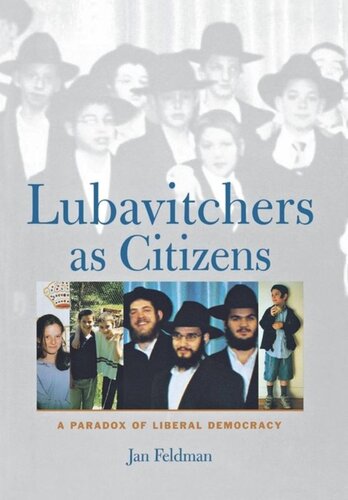

Most ebook files are in PDF format, so you can easily read them using various software such as Foxit Reader or directly on the Google Chrome browser.
Some ebook files are released by publishers in other formats such as .awz, .mobi, .epub, .fb2, etc. You may need to install specific software to read these formats on mobile/PC, such as Calibre.
Please read the tutorial at this link: https://ebookbell.com/faq
We offer FREE conversion to the popular formats you request; however, this may take some time. Therefore, right after payment, please email us, and we will try to provide the service as quickly as possible.
For some exceptional file formats or broken links (if any), please refrain from opening any disputes. Instead, email us first, and we will try to assist within a maximum of 6 hours.
EbookBell Team

4.0
56 reviewsLubavitchers are active in the civic life of their communities and so should be considered good citizens by advocates of participatory democracy. However, their obviously nonliberal worldview tends to elicit rancor in precisely those quarters. The notion that democratic political institutions require the support of a democratic political culture is pervasive in political theory. Many scholars treat democratic virtues and liberal values as synonymous. As a result, nonliberal groups are viewed with suspicion: if they reject liberal values, they are also seen as rejecting democratic ones. Jan Feldman focuses on a subset of Chassidic Judaism known as Lubavitch, or ChaBad, to explore this assumption.Lubavitchers make an excellent test case, she explains, because they are informed, politically active, and democratic on the one hand, yet embrace nonliberal values on the other. Unlike the Amish or Hutterites, they do not rely on rural isolation for group survival but function remarkably well in secular, urban settings. They embrace rather than withdraw from political life. Although they do not use the state to promote their worldview to a wider audience, their entry into the public realm often generates hostility and fear.Feldman does not claim that liberal values are irrelevant to democracy nor does she argue that all nonliberal groups are equally benign. "What Lubavitchers allow us to investigate," she writes, "is the common assumption that liberal and democratic attitudes are inextricably linked." Through numerous interviews in the centers of Lubavitch life in Montreal, New York, and Washington, D.C., she not only illuminates a group fascinating in its own right but also provides insights into long-held assumptions about the relationship between liberal and democratic values.